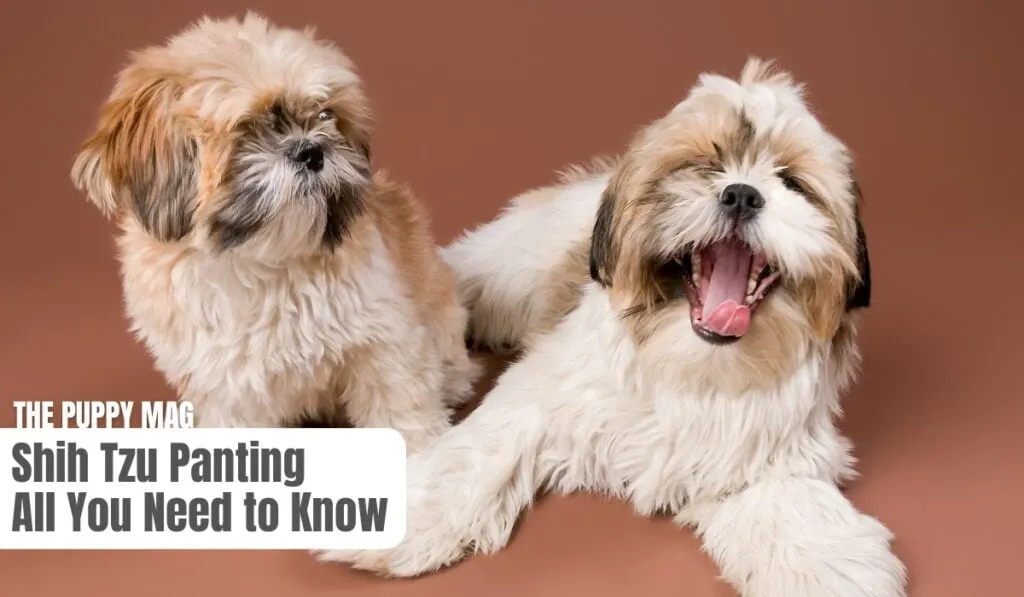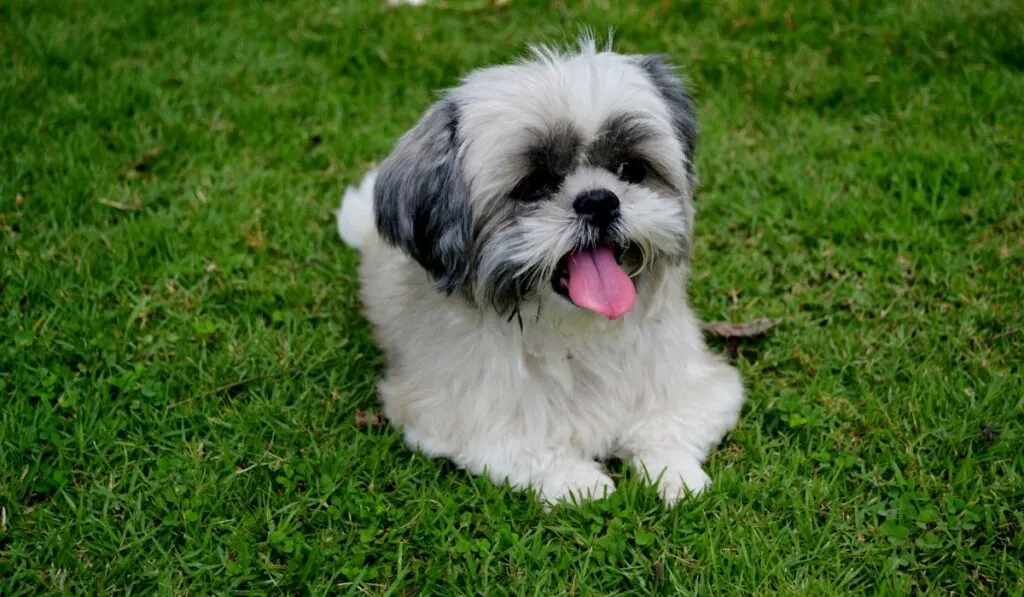There’s one behavior that can sometimes cause concern for Shih Tzu owners: panting.
This help guide breaks down everything you need to know about Shih Tzu panting and discusses what is and isn’t normal.
What we’ll cover:
➡️ Normal reasons why Shih Tzus pant
➡️ Identifying normal vs excessive panting
➡️ 5 Causes of excessive panting in Shih Tzus
➡️ How to help your Shih Tzu calm their breathing
➡️ Shih Tzu puppies and panting
➡️ When to see a vet

Shih Tzus & Panting
Like all dogs, Shih Tzus pant. Panting in dogs is akin to sweating in humans – it’s their way of cooling down and regulating body temperature. Also, it helps dogs to oxygenate their bodies.
However, there’s a difference between normal panting and excessive or heavy panting.
Normal Reasons Why Shih Tzus Pant
Panting can be a normal behavior in Shih Tzus for several reasons.
➡️ According to American Kennel Club, these could include:
1. Heat: On hot days, you might notice your Shih Tzu panting more frequently. This is their way of cooling off and is entirely normal. However, always ensure they have access to fresh water and a cool place to rest.
2. Exercise: After a good romp in the park, your Shih Tzu is likely to pant. Just like humans breathe harder after exercise, so do dogs.
3. Excitement: Dogs often pant when they’re excited or happy. If your Shih Tzu is wagging their tail furiously and panting, they’re likely just thrilled to see you!
4. New environments or people: If your Shih Tzu is meeting new dogs, places, or people then this can cause them to pant quickly and that’s completely normal. This is another variation of excitement.
Relevant: Keeping Shih Tzus Cool In Hot Weather
Identifying Normal vs Excessive Panting
It’s crucial to distinguish between normal panting and excessive panting. Unfortunately there isn’t a magical number of pants per minute that we can go by. This means it all comes down to the situation and taking everything into context.
✅ Normal panting is typically light, quiet, and occurs in response to a trigger like heat or exercise. Once the trigger is removed, the panting should cease.
❌ Excessive panting, as explained by VCA Hospitals, is characterized by heavy breathing that doesn’t stop even when the dog is relaxed and cool. It can also be loud and intense.
Consider whether it makes sense for your Shih Tzu to panting the way they are… Have they just exercised, got excited, played with their toy, or have they actually been resting in a cool calm room… The events leading up to the panting are important to be aware of.

5 Reasons Why Your Shih Tzu Is Excessively Panting
If your Shih Tzu is panting excessively, there could be a variety of reasons, some of which may require immediate attention.
➡️ Heatstroke
Heatstroke occurs when a dog’s body temperature rises significantly above the normal range. Shih Tzus, being a brachycephalic breed, are more prone to heatstroke because of their compromised airway, making it harder for them to pant efficiently to cool down.
Signs of heatstroke in dogs can include excessive panting, drooling, reddened gums, vomiting, diarrhea, mental dullness or loss of consciousness, uncoordinated movement, and collapse.
Heatstroke is a medical emergency, and if you suspect your Shih Tzu is suffering from it, you need to take immediate action to cool them down and get them to a vet.
➡️ Anxiety or Stress
Stress and anxiety can cause physical reactions in dogs, and one common sign is heavy panting. Shih Tzus may experience stress or anxiety due to a variety of factors such as separation, noise, or changes in their environment.
Other signs of anxiety can include pacing, whining, destructive behavior, and changes in appetite. If your Shih Tzu is panting excessively due to anxiety, it’s important to find and address the source of their stress.
In some cases, a veterinarian may suggest behavior modification techniques, environmental changes, or even medications to help manage anxiety.
➡️ Pain
Dogs can’t tell us when they’re in pain, but they can show us through physical signs, including excessive panting.
If your Shih Tzu is panting more than usual and seems restless, they could be experiencing discomfort. This could be due to any number of issues, ranging from dental problems to arthritis to more serious conditions.
Other signs of pain can include changes in behavior, appetite, or sleep patterns. If you suspect your Shih Tzu is in pain, it’s important to consult with a vet as soon as possible.
➡️ Medical conditions
There are several medical conditions that can cause excessive panting in dogs, including heart disease, respiratory disorders, Cushing’s disease, and obesity.
If your Shih Tzu is overweight or obese, the extra body weight can make breathing more difficult and lead to panting. Heart and respiratory diseases can interfere with the dog’s ability to get enough oxygen, leading to panting as the dog tries to increase their oxygen intake.
Cushing’s disease, a condition that results in an overproduction of cortisol by the adrenal glands, also lists heavy panting as a symptom.
➡️ Brachycephalic Syndrome
Shih Tzus, as mentioned before, are a brachycephalic breed, which means they have a short nose and flat face. This unique facial structure can lead to several issues known as Brachycephalic Syndrome.
Dogs with this syndrome have narrowed nostrils, an elongated soft palate, and sometimes a small windpipe, which can make breathing difficult and cause excessive panting, particularly during exertion or in hot weather.
If you notice your Shih Tzu struggling to breathe or panting excessively, it’s important to consult with your vet, as surgery may be necessary in some cases to alleviate the condition.
Each of these reasons for excessive panting underlines the importance of being vigilant and proactive in caring for your Shih Tzu. Knowing what’s normal for your pet can help you notice when something’s amiss, and ensure they get the medical attention they need in a timely manner.
How To Help a Shih Tzu Calm Their Breathing
When your Shih Tzu is panting excessively, it’s important to address the immediate concern and also consider any underlying issues that may be causing the heavy breathing.
➡️ Here are some steps you can take to help your Shih Tzu find relief:
Short-Term Solutions
- Create a cool environment: Move your Shih Tzu to a cool area with good ventilation. Use fans or air conditioning to provide a comfortable temperature. Avoid exposing them to direct sunlight or hot and humid conditions.
- Offer fresh water: Ensure your Shih Tzu has access to clean and cool water at all times. Hydration is important, especially when they’re panting to cool down.
- Avoid strenuous activities: Limit your Shih Tzu’s physical exertion, especially during hot weather. Avoid intense exercise or play sessions that could further increase their breathing rate.
- Provide relaxation: Create a calm and quiet space for your Shih Tzu. Offer a comfortable bed or designated area where they can rest undisturbed. Soft music or white noise can help create a soothing environment.
Long-Term Solutions
While short-term solutions provide immediate relief, it’s crucial to address any underlying causes of excessive panting for long-term improvement.
➡️ Consider the following steps:
- Consult with a veterinarian: Schedule a visit to discuss your Shih Tzu’s excessive panting. A veterinarian can perform a thorough examination to identify any potential health issues or underlying conditions contributing to the heavy breathing.
- Follow recommended treatments: If an underlying medical condition is found, follow your vet’s advice regarding treatment. This may include medication, lifestyle changes, or surgery depending on the specific diagnosis.
- Manage weight and exercise: If your Shih Tzu is overweight, consult with your vet to develop a suitable weight management plan. Maintaining a healthy weight can improve breathing and overall well-being. Regular, moderate exercise appropriate for your dog’s breed and age can also help improve their cardiovascular fitness.
- Address anxiety and stress: If stress or anxiety is causing your Shih Tzu’s excessive panting, work with a veterinarian or a professional dog behaviorist to develop a behavior modification plan. Techniques such as desensitization, counter-conditioning, and providing a safe and predictable environment can help alleviate stress.
Remember, long-term solutions require ongoing effort and collaboration with your veterinarian. Regular check-ups and open communication with your vet are vital to monitor your Shih Tzu’s progress and adjust the treatment plan as needed.
Shih Tzu Puppies & Panting
If you’re worried about your Shih Tzu puppy panting quickly, it’s first important to know that for the most part this will be normal.
Puppies are unable to control and regulate their body temperature like an adult dog can, and this results in naturally quick breathing.
Due to this, it can be difficult spotting the difference between panting that’s normal and panting that indicates an issue.
If you are unsure, or your pup displays other negative symptoms then consult your veterinarian right away. Other symptoms could be a change in behavior, diarrhea, vomiting, nausea, whining, random barking or other unusual changes from the norm.
When To See a Vet
If your Shih Tzu’s heavy panting doesn’t stop, even after you’ve tried to remove any apparent triggers, or if you notice other signs of distress, it’s time to see a vet.
Excessive panting, according to Pet Health Network, can be a symptom of serious conditions like heart failure, chronic bronchitis, or lung disease.
Early diagnosis and treatment are crucial in managing these conditions, so don’t delay a vet visit if your Shih Tzu is excessively panting.
In conclusion, panting is a natural behavior in Shih Tzus and other dog breeds. However, excessive or heavy panting may signal that something is wrong. If you’re unsure about your Shih Tzu’s panting, it’s always best to seek advice from a professional. After all, keeping our furry friends happy and healthy is what pet ownership is all about!
